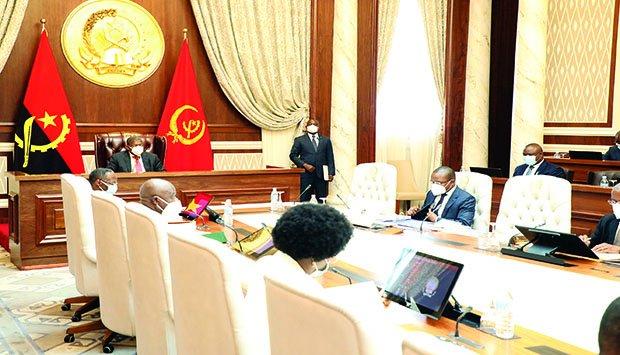Africa-Press – Angola. The Executive approved on Monday (31), during the first ordinary session of the Council of Ministers, guided by the President of the Republic, João Lourenço, a 50 percent increase in the national minimum wage, to face the degradation of the purchasing power of the workers and the need for maintenance and economic sustainability.
Speaking to the press at the end of the meeting, the Minister of Public Administration, Labor and Social Security, Teresa Dias, referred, as an example, that for the Agriculture sector the national minimum wage could go from 21,454 Kwanzas to 32,000 181 and 15 cents, in Transport, Services and Manufacturing from 26 thousand 817 to 40 thousand 226 and in Trade and Industry from 32 thousand to 181 thousand Kwanzas. “And our proposal for a 50 percent increase would rise to 48,271 Kwanzas”, he stressed.
On this matter, the Council of Ministers considered, for submission to the National Assembly, a proposal for a Law that authorizes the Holder of the Executive Power to legislate on the general principles relating to the organization and application of the evidentiary structure of salary scales and of subsidies or salary supplements. of the Civil Service, with a view to restoring equal pay between civil servants and administrative agents in the non-technical career and in other careers under the general regime, up to full professors.
Adjustment of civil service salaries
Regarding the adjustment of salaries for the Civil Service, Teresa Dias announced that it will focus more on the lower classes. As an example, she said that, in a first scenario, it is expected that the salary for cleaning assistants will rise from 33 thousand to 67 thousand Kwanzas. “With that, we would be having a 102 percent impact on what the previous salary was,” she pointed out.
She stressed that this decision resulted from several studies carried out, which allowed, for the first time, to have a positive differentiation. She added that this exercise, “with the greatest impact”, went from non-technical to technical classes and gradually moved up towards positive differentiation. Here, a technician or main specialist will be able to see the salary go from 214 thousand to 223 thousand Kwanzas.
“There we have an increase of only 4 percent. That is to say that, from the senior technicians from the 3rd to the full professor, we only made a signal as an impact in a value of 4 percent”, he stressed. The official stressed that negotiations are still in progress, in order to avoid that the problems of the Civil Service are solved by islands.
Teresa Dias said that she is working with the Ministry of Finance to, in a next phase, in the short term, find, after all the negotiations, a common denominator, for the classes that, at this stage, did not see the problems properly addressed. “From this perspective, in the short term, we will have this upper class even to the professors with a new scenario, depending on the results we have from the negotiations and, also, depending on what the salary fund available for this purpose is”, she clarified. Public office holders exempt from adjustments.
In the scope of the adjustment to the salaries of the Civil Service, the minister underlined that the holders of political positions, leaders and chiefs were not covered. He explained that the decision is due to the fact that the Executive is more concerned with solving the problem of those who earn the least. “Therefore, he understood that, at this stage, they should keep the salaries they have until better economic and financial conditions are found to also deserve this appreciation”, he emphasized.
Dedicate the greatest value to the lower classes
In turn, the Minister of Finance, Vera Daves, clarified that the remuneration of public office holders and politicians was not touched on, to leave space in terms of budgetary reserve, in order to dedicate the greatest possible amount to the lower classes. The idea, therefore, he stressed, is to maximize adjustment among people who earn less and because they are the ones who suffer the most from the impact of inflation and the difficulties in acquiring the most basic items to satisfy individual needs.
“It was this exercise that we did”, he said, assuring that dialogue will continue with trade union organizations and with the forces that represent senior technicians. “We simply appeal to the understanding of these classes, so that the final result is the best possible and that it does not jeopardize everything we still have to do in several other classes of expenses, whether current or capital”, he stressed.
The Minister of Finance said that the idea was to make a greater adjustment, but to do so would imply questioning the future of those salaries, the investment that must continue to be made in various sectors, such as Education and Health, which, as he pointed out, “these same people will benefit”.
Vera Daves stressed that the first premise of these measures is aimed at correcting the purchasing power of families, correcting their remuneration in the best possible way, taking into account the loss of purchasing power resulting from the inflation that the country is experiencing. “But in making this correction, we cannot lose sight of the importance of keeping public finances sustainable,” she warned.
Minister of Finance ensures availability of money
The Minister of Finance assured that there is money available to move forward with the implementation of the increase in the national minimum wage and the adjustment of civil service salaries. To a question about when the national minimum wage will be increased and the salaries of the Civil Service will be adjusted, Vera Daves clarified that the process must still follow an approval path, with emphasis on a set of diplomas that must follow its way, one of them being the Presidential Legislative Decree.
“It means that we will still have to go to the National Assembly, to have the legislative authorization to do so. It will follow the normal procedures, but we will try to be as diligent as possible, because we are aware that this is a measure of great impact. and we are also aware of the difficulties that our citizens have been experiencing”, he concluded.
The announcement of the increase in the national minimum wage and the adjustment of civil service salaries was made by the MPLA president, João Lourenço, on January 28, in Cuando Cuban-go province, during the launch of the party’s Political Agenda for this year. .
Law on public appropriation created
Yesterday, the Council of Ministers considered, for submission to the National Assembly, a draft law that establishes the legal regime for public appropriation. According to the communiqué issued at that meeting, guided by the President of the Republic, this diploma aims to appropriate, through nationalization, the voluntary delivery of goods or a judicial declaration of transfer of goods to the State.
The document states that such assets may be movable or immovable, shareholdings, real estate securities, financial assets, intellectual property rights, as well as other types of property that have been the subject of legal or voluntary succession of private individuals and legal entities, when, for exceptional and specially substantiated reasons, this proves necessary to safeguard the public interest.
A draft law amending the Angolan Criminal Procedure Code was also considered. This diploma aims to make specific legislative changes to improve some precepts of the criminal procedural legal framework, in order to speed up justice and more effectively guarantee the rights of defendants and victims.
Social Communication Legislative Package
Yesterday’s session of the Council of Ministers also considered, for submission to the National Assembly, a legislative package to adjust certain criteria and assumptions on access to and the exercise of Social Communication activity. The document will focus on the areas of press, television, radio broadcasting, polls and opinion surveys, in order to make it more comprehensive and flexible, as well as introducing new concepts into the dynamics of the activity.
The Law on Polls and Opinion Inquiries, amendments to the Press Law, the Law on the Exercise of Television Activity, the Law on the Exercise of Radio Broadcasting Activity, the Law on the Statute of Journalists and the Organic Law of the Angolan Media Regulatory Authority. In the field of Transport, the Council of Ministers also considered, for submission to the National Assembly, a proposal to update the Law on Merchant Marine, Ports and Related Activities, with a view to bringing it into line with the new international legal order.
This diploma allows full, effective and efficient application and the creation of premises to leverage the national economy. It also aims to encourage exports and foreign direct investment and to adopt the best international practices, as well as to strengthen the powers of regulation, supervision and coordination, on the part of the Regulatory Entity of the Sector, the National Maritime Agency.
In the context of foreign policy, the Council of Ministers approved the agreement signed between Angola and the Secretariat of the Organization of African, Caribbean and Pacific States, concerning the material and the organization and protocol provisions of the 10th Summit of Heads of State and Government. version of the OEACP.
That auxiliary collegiate body of the Holder of the Executive Power also approved the memorandum of intent between the Ministry of Transport of Angola, the Private Office of Sheikh Ahmed Dalook Al Maktoum, from the United Arab Emirates, and DNATA, a company that provides airport services for the United Arab Emirates.
This instrument establishes the basis for negotiating the terms of a contract whereby the consortium formed by the Private Office and DNATA will provide airport services at Luanda International Airport. The Council of Ministers was informed about the level of development of economic and social projects that could be concluded by July of the current year.
For More News And Analysis About Angola Follow Africa-Press






